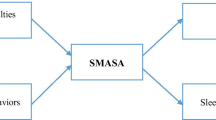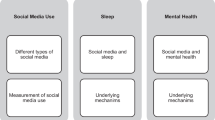Abstract
The current study explored how and to what extent sleep problems in children with autism spectrum disorder (ASD) impacted their parents’ quality of life (QOL). A total of 440 ASD children and 344 age-matched typically developing (TD) children were included in the case–control designed study. In the TD group, a linear regression model showed that the Children’s Sleep Habits Questionnaire (CSHQ) total scores were negatively associated with maternal mental health summary (MCS) scores in the SF-36v2 (β = − 2.831), while in the ASD group, the CSHQ total scores were negatively associated with the parental physical health summary (PCS) scores (β = − 3.030 for mothers, β = − 3.651 for fathers). Path analysis showed that sleep problems in ASD children had both direct and indirect effects on maternal PCS scores. The results indicated that sleep problems in children with ASD might affect parental QOL differently from TD children, and act as independent impact factors on parental physical health.


Similar content being viewed by others
References
Lord C, Elsabbagh M, Baird G, Veenstra-Vanderweele J (2018) Autism spectrum disorder. Lancet 392:508–520
Baio J, Wiggins L, Christensen DL, Maenner MJ, Daniels J, Warren Z, Kurzius-Spencer M, Zahorodny W, Robinson RC, White T, Durkin MS, Imm P, Nikolaou L, Yeargin-Allsopp M, Lee LC, Harrington R, Lopez M, Fitzgerald RT, Hewitt A, Pettygrove S, Constantino JN, Vehorn A, Shenouda J, Hall-Lande J, Van Naarden BK, Dowling NF (2018) Prevalence of autism spectrum disorder among children aged 8 years—autism and developmental disabilities monitoring network, 11 sites, United States, 2014. MMWR Surveill Summ 67:1–23
Wang G, Liu Z, Xu G, Jiang F, Lu N, Baylor A, Owens J (2016) Sleep disturbances and associated factors in chinese children with autism spectrum disorder: a retrospective and cross-sectional study. Child Psychiatry Hum Dev 47:248–258
Souders MC, Mason TB, Valladares O, Bucan M, Levy SE, Mandell DS, Weaver TE, Pinto-Martin J (2009) Sleep behaviors and sleep quality in children with autism spectrum disorders. Sleep 32:1566–1578
Reynolds AM, Soke GN, Sabourin KR, Hepburn S, Katz T, Wiggins LD, Schieve LA, Levy SE (2019) Sleep problems in 2- to 5-year-olds with autism spectrum disorder and other developmental delays. Pediatrics 143:e20180492
Souders MC, Zavodny S, Eriksen W, Sinko R, Connell J, Kerns C, Schaaf R, Pinto-Martin J (2017) Sleep in children with autism spectrum disorder. Curr Psychiatry Rep 19:34
Veatch OJ, Reynolds A, Katz T, Weiss SK, Loh A, Wang L, Malow BA (2016) Sleep in children with autism spectrum disorders: how are measures of parent report and actigraphy related and affected by sleep education? Behav Sleep Med 14:665–676
Goldman SE, Richdale AL, Clemons T, Malow BA (2012) Parental sleep concerns in autism spectrum disorders: variations from childhood to adolescence. J Autism Dev Disord 42:531–538
Mazzone L, Postorino V, Siracusano M, Riccioni A, Curatolo P (2018) The relationship between sleep problems, neurobiological alterations, core symptoms of autism spectrum disorder, and psychiatric comorbidities. J Clin Med 7:102
Veatch OJ, Sutcliffe JS, Warren ZE, Keenan BT, Potter MH, Malow BA (2017) Shorter sleep duration is associated with social impairment and comorbidities in ASD. Autism Res 10:1221–1238
Johnson CR, Smith T, DeMand A, Lecavalier L, Evans V, Gurka M, Swiezy N, Bearss K, Scahill L (2018) Exploring sleep quality of young children with autism spectrum disorder and disruptive behaviors. Sleep Med 44:61–66
Lin J, Suurna M (2018) Sleep apnea and sleep-disordered breathing. Otolaryngol Clin N Am 51:827–833
He S, Zhu J, Jiang W, Ma J, Li G, He Y (2019) Sleep disturbance, negative affect and health-related quality of life in patients with maintenance hemodialysis. Psychol Health Med 24:294–304
Alhazmi A, Petersen R, Donald KA (2018) Quality of life among parents of South African children with autism spectrum disorder. Acta Neuropsychiatr 30:226–231
Whoqol Group (1995) The World Health Organization Quality of Life assessment (WHOQOL): position paper from the World Health Organization. Soc Sci Med 41:1403–1409
Mugno D, Ruta L, D’Arrigo VG, Mazzone L (2007) Impairment of quality of life in parents of children and adolescents with pervasive developmental disorder. Health Qual Life Outcomes 5:22
Lopez-Wagner MC, Hoffman CD, Sweeney DP, Hodge D, Gilliam JE (2008) Sleep problems of parents of typically developing children and parents of children with autism. J Genet Psychol 169:245–259
Hodge D, Hoffman CD, Sweeney DP, Riggs ML (2013) Relationship between children’s sleep and mental health in mothers of children with and without autism. J Autism Dev Disord 43:956–963
Wang Y, Xiao L, Chen RS, Chen C, Xun GL, Lu XZ, Shen YD, Wu RR, Xia K, Zhao JP, Ou JJ (2018) Social impairment of children with autism spectrum disorder affects parental quality of life in different ways. Psychiatry Res 266:168–174
Cen CQ, Liang YY, Chen QR, Chen KY, Deng HZ, Chen BY, Zou XB (2017) Investigating the validation of the Chinese Mandarin version of the Social Responsiveness Scale in a Mainland China child population. BMC Psychiatry 17:51
Owens JA, Spirito A, McGuinn M (2000) The Children’s Sleep Habits Questionnaire (CSHQ): psychometric properties of a survey instrument for school-aged children. Sleep 23:1043–1051
Lam ETP, L.C.L.Y (2008) Psychometrics and population norm of the Chinese. (HK) SF-36 Health Survey: version 2. The Hong Kong Practitioner 30:185–198
Lu L, Wang L, Yang X, Feng Q (2009) Zarit Caregiver Burden Interview: development, reliability and validity of the Chinese version. Psychiatry Clin Neurosci 63:730–734
Constantino JN, Przybeck T, Friesen D, Todd RD (2000) Reciprocal social behavior in children with and without pervasive developmental disorders. J Dev Behav Pediatr 21:2–11
Bolte S, Poustka F, Constantino JN (2008) Assessing autistic traits: cross-cultural validation of the social responsiveness scale (SRS). Autism Res 1:354–363
Tietze AL, Zernikow B, Michel E, Blankenburg M (2014) Sleep disturbances in children, adolescents, and young adults with severe psychomotor impairment: impact on parental quality of life and sleep. Dev Med Child Neurol 56:1187–1193
Cohen S, Conduit R, Lockley SW, Rajaratnam SM, Cornish KM (2014) The relationship between sleep and behavior in autism spectrum disorder (ASD): a review. J Neurodev Disord 6:44
Cuomo BM, Vaz S, Lee E, Thompson C, Rogerson JM, Falkmer T (2017) Effectiveness of sleep-based interventions for children with autism spectrum disorder: a meta-synthesis. Pharmacotherapy 37:555–578
Gringras P, Nir T, Breddy J, Frydman-Marom A, Findling RL (2017) Efficacy and safety of pediatric prolonged-release melatonin for insomnia in children with autism spectrum disorder. J Am Acad Child Adolesc Psychiatry 56:948-957.e4
Roberts CA, Smith KC, Sherman AK (2019) Comparison of online and face-to-face parent education for children with autism and sleep problems. J Autism Dev Disord 49:1410–1422
Acknowledgements
We thank all the subjects who participated in this study.
Funding
This study was supported by the National Basic Research Program of China (Grant No. 2012CB517901) and the National Natural Science Foundation of China (Grant Nos. 81974217, 81601197). The sponsors helped with the design of the study and the collection and analysis of the data.
Author information
Authors and Affiliations
Corresponding authors
Ethics declarations
Conflict of interest
All authors declare that they have no competing interests.
Ethical Approval
This study was part of a large research project that was approved by the Human Ethics Committee of the Second Xiangya Hospital of Central South University. Written informed consent was obtained from all enrolled families.
Additional information
Publisher's Note
Springer Nature remains neutral with regard to jurisdictional claims in published maps and institutional affiliations.
Electronic Supplementary Material
Below is the link to the electronic supplementary material.
Rights and permissions
About this article
Cite this article
Liu, R., Dong, H., Wang, Y. et al. Sleep Problems of Children with Autism May Independently Affect Parental Quality of Life. Child Psychiatry Hum Dev 52, 488–499 (2021). https://doi.org/10.1007/s10578-020-01035-z
Received:
Revised:
Accepted:
Published:
Issue Date:
DOI: https://doi.org/10.1007/s10578-020-01035-z




